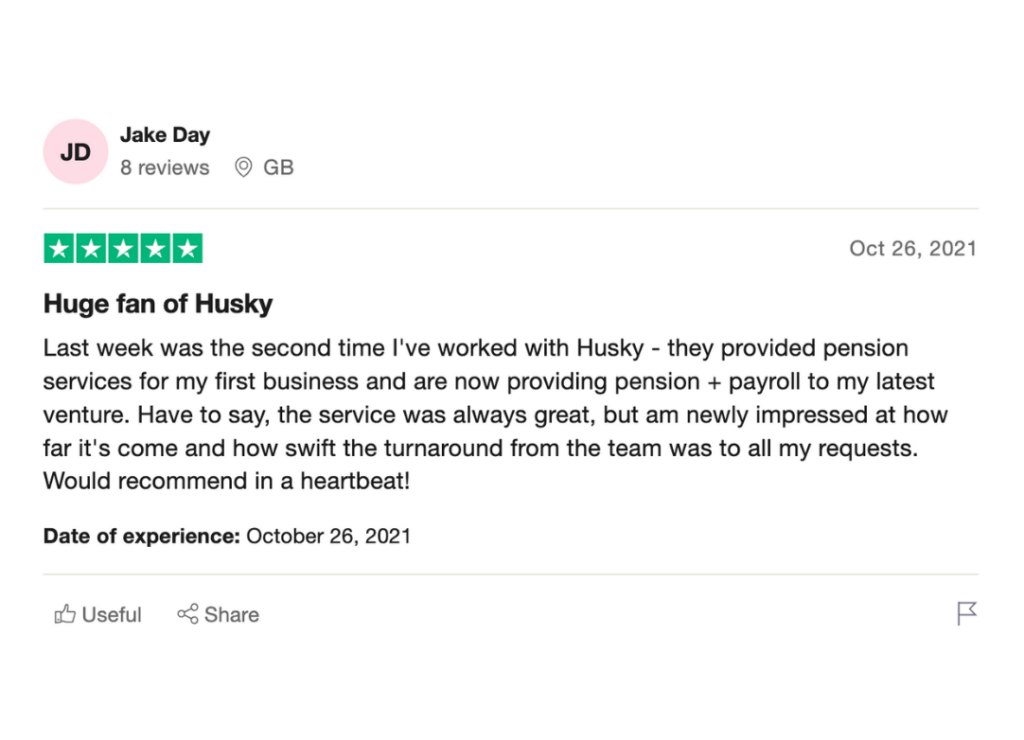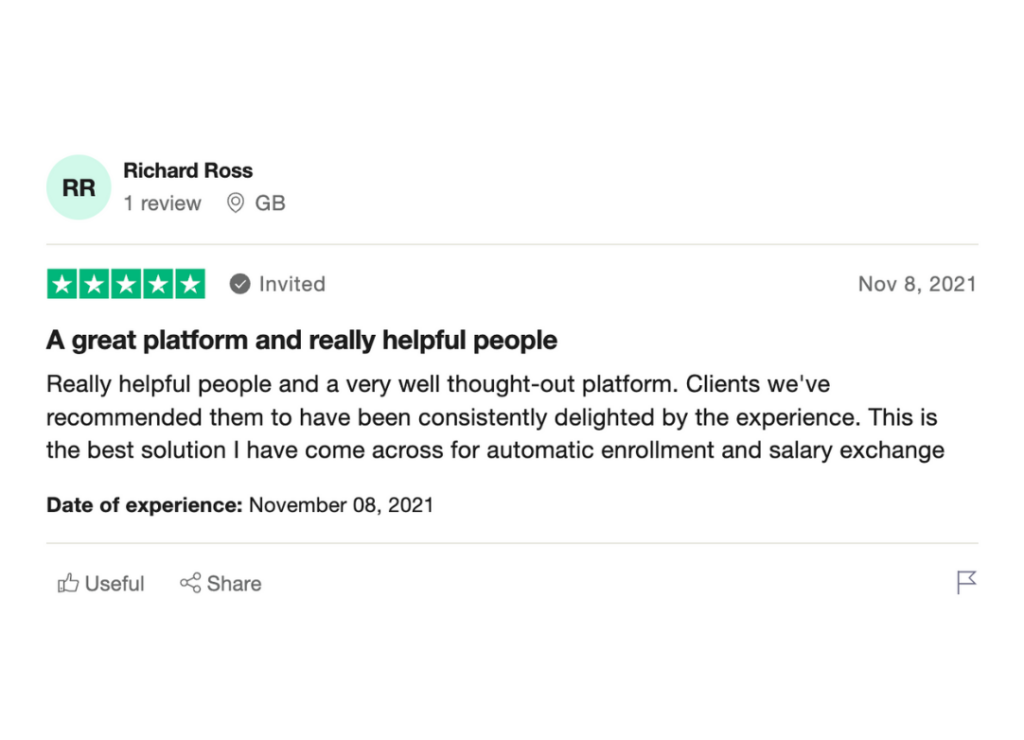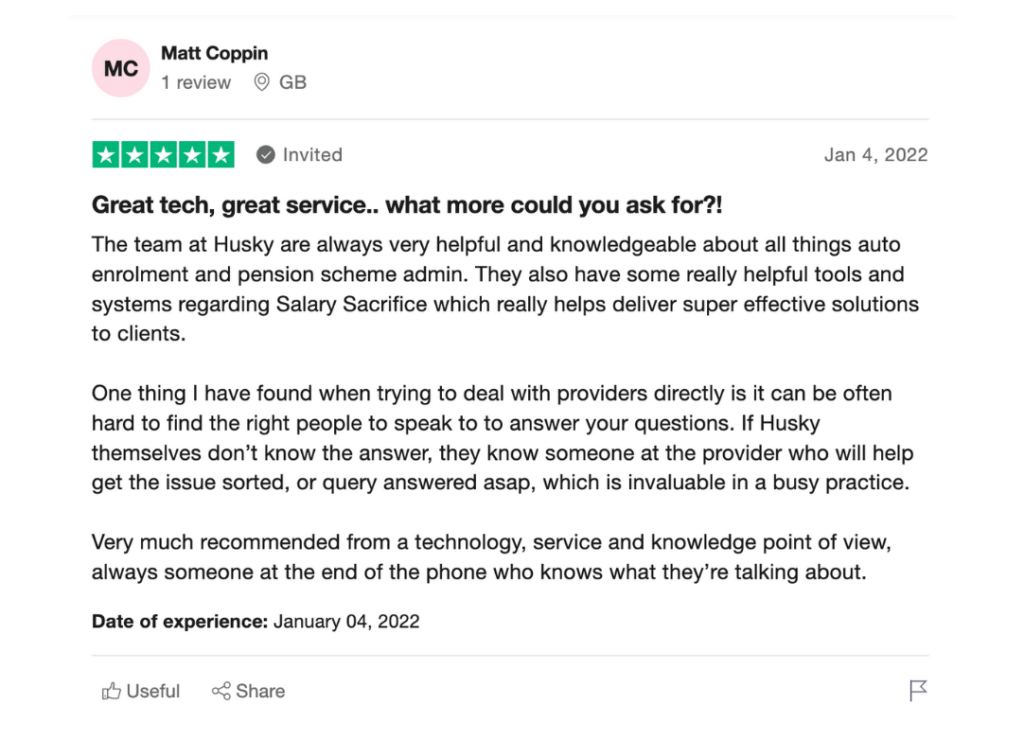
SALARY EXCHANGE, ALSO KNOWN AS SALARY SACRIFICE
Why is setting up Salary Exchange
such a great idea?
Your staff can adjust their take-home pay, incurring less NI, leaving more money in their hands, month after month. Your company will also pay lower NICs and Corporation tax. It’s a win-win for both employers and staff. That’s why Moore Kingston Smith (MKS) has partnered with Husky, the workplace pensions specialist that make the Salary Exchange process easy through automation.


We used these parameters for the scenario above: 50k average salary – PPS1 – 5% employee contributions – 30 workers – 50% NI re-investment.
Husky's technology advantages
95% of small businesses are not taking advantage of the opportunity to save money for their staff and their firm via Salary Exchange, despite 99% of big companies doing it, mainly due to challenges like complexity, lack of knowledge, and high compliance costs.
Husky’s industry-disrupting technology automates the solution for all businesses, ensuring easy, cost-effective and compliant Salary Exchange implementation.
Automated process
The Husky App streamlines agreements, it saves time on drafting and signing—no need to change contracts or involve a solicitor. Manage pension changes directly in the app, emphasising it’s an ongoing solution, not just a one-off.
Ensure compliance
We handle setup, administration, and ensure compliance without incurring Independent Financial Advisor (IFA) costs.
Qualifying earnings
Husky is one of the only providers that can set up Salary Exchange schemes based on Qualifying Earnings (which is used by most SMEs)
Payroll management
Husky streamlines payroll changes, reducing administrative coordination efforts, and can even run your payroll.
Calculate your savings
See how implementing salary exchange can positively benefit your company and workers.
Simple steps to get started
Onboarding call
Book a call for a smooth Salary Exchange Pension setup. Learn how it works and discuss timelines and communication with our team.
Delegate access
Simply let us know your current pension provider, and we’ll send a straightforward guide on granting us delegate access to the scheme.
Go live
Employees can now request and sign the agreement directly from the Husky app and the employer only has to accept it online. That’s it!
Husky's journey
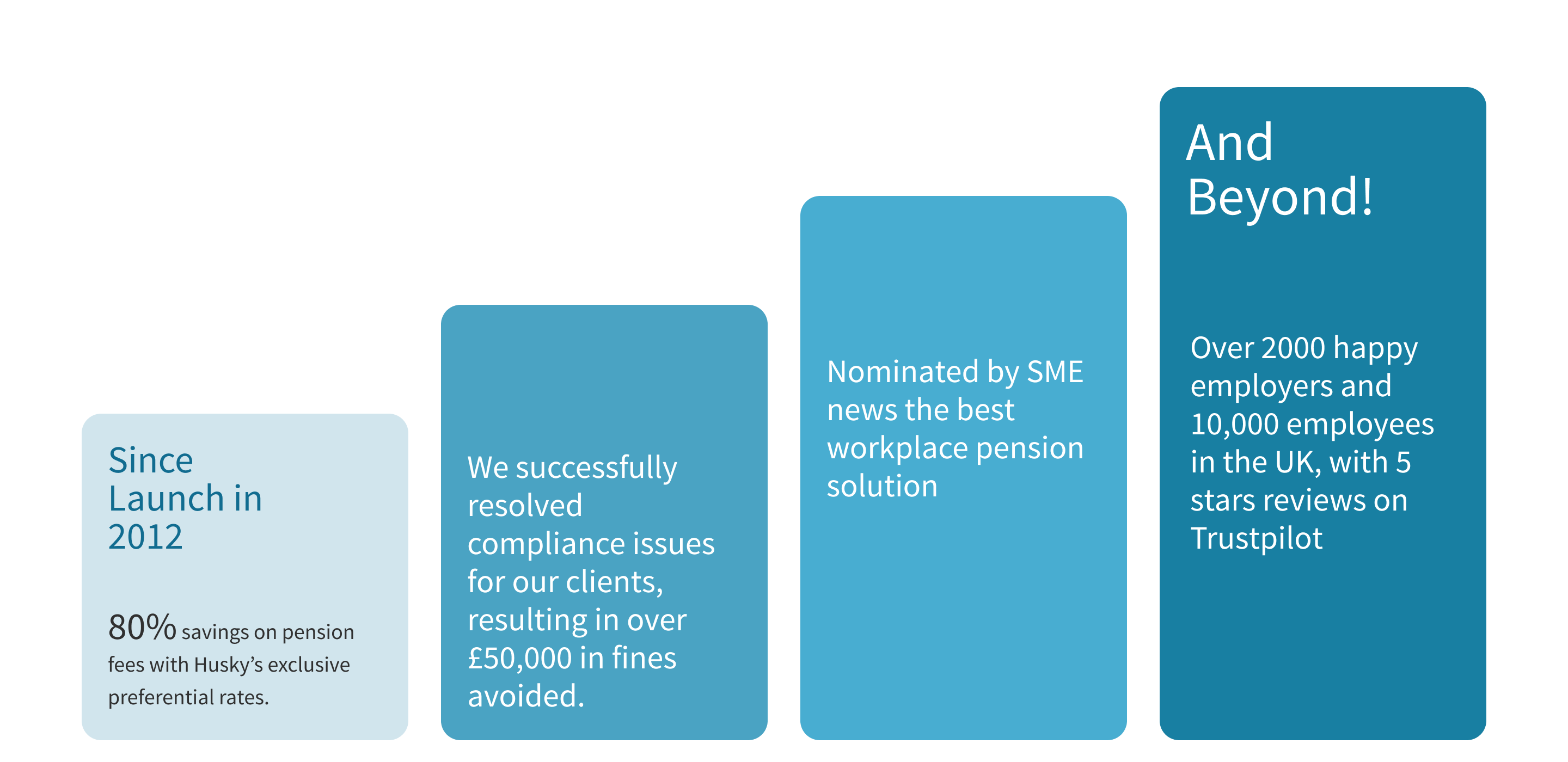
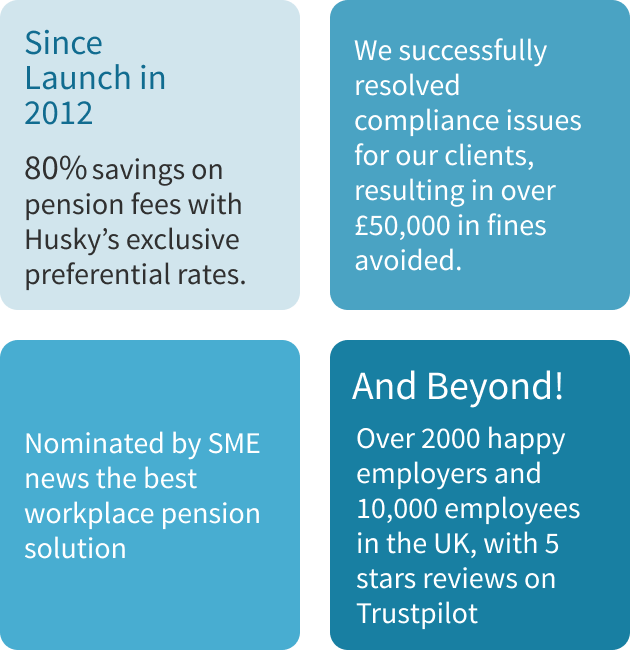
Watch the video
to learn more
Gain some valuable insights
Salary Sacrifice: Transforming HR in 2025
Be Ready: Higher Employer NI Rate in April 2025
Why Director-Only Companies Should Consider Workplace Pensions
Salary Sacrifice: Transforming HR in 2025
Award-winning solution



Here are 7 frequently asked questions about Salary Exchange
If you have more questions you can always access our knowledge base on this link.
Employer NI savings
As the employee’s gross earnings are reduced, the employer also saves on their National Insurance Contributions (NIC).
Those savings can be re-invested into the employee’s workplace pension pot to provide an even better employee benefit and encourage them to join.
With Husky, you can also split those savings into specific %s so you can share the savings between the company and the employee.
Salary Exchange Guide
Salary Exchange is an agreement between the employee and the employer. The employee's contract of employment is altered to reflect that they have agreed to exchange part of their future gross salary or bonus entitlement in return for a non-cash benefit, such as an employer pension contribution.
What are the benefits of a Salary Exchange scheme?
- Employers save on NI contributions while employees can save on tax as well as NI contributions.
- Employers can reinvest any NIC savings in their business or their employees’ pension plans.
- Employees receive a higher pension contribution or take-home pay, depending on how the arrangement’s set up.
- Employees can benefit from a bigger retirement fund, if NIC savings are reinvested back into their plan.
Are there any possible drawbacks to a Salary Exchange scheme?
- Lower life cover (employers generally calculate entitlement as a multiple of salary which would be lower)
- Lower borrowing available on mortgages (as per life cover the borrowing level is determined by a multiple of a lower salary)
- Entitlement to state benefits eg Statutory Maternity Pay and the State Pension may be affected if your salary falls below the level at which you pay National Insurance contributions.
- The employee might not be able to revert to their old (pre-sacrifice) salary if personal circumstances change. The employer would have to agree to a further change to the employee's contract of employment.
Those savings can be re-invested into the employee’s workplace pension pot to provide an even better employee benefit and encourage them to join. With Husky, you can also split those savings into specific %s so you can share the savings between the company and the employee.
Can a salary exchange agreement be altered?
A salary exchange agreement can normally be altered, for example, if someone opts out of an automatic enrolment scheme with salary exchange.
For any other circumstances, it depends on how the agreement has been set up. It may be necessary to change the terms of a salary sacrifice arrangement where a lifestyle change significantly alters an employee’s financial circumstances.
This may include:
- changes to circumstances directly arising as a result of coronavirus (COVID-19)
- marriage
- divorce
- partner becoming redundant or pregnant
What are the benefits of a Salary Exchange scheme?
- Employers save on NI contributions while employees can save on tax as well as NI contributions.
- Employers can reinvest any NIC savings in their business or their employees’ pension plans.
- Employees receive a higher pension contribution or take-home pay, depending on how the arrangement’s set up.
- Employees can benefit from a bigger retirement fund, if NIC savings are reinvested back into their plan.
Are there any possible drawbacks to a Salary Exchange scheme?
- Lower life cover (employers generally calculate entitlement as a multiple of salary which would be lower)
- Lower borrowing available on mortgages (as per life cover the borrowing level is determined by a multiple of a lower salary)
- Entitlement to state benefits eg Statutory Maternity Pay and the State Pension may be affected if your salary falls below the level at which you pay National Insurance contributions.
- The employee might not be able to revert to their old (pre-sacrifice) salary if personal circumstances change. The employer would have to agree to a further change to the employee's contract of employment.
Those savings can be re-invested into the employee’s workplace pension pot to provide an even better employee benefit and encourage them to join. With Husky, you can also split those savings into specific %s so you can share the savings between the company and the employee.
Will Salary Exchange affect my current entitlement to Tax Credits?
You should speak to your tax credits office before you decide whether to participate in a Salary Exchange Scheme. You must also notify your tax credits office once you have exchanged your salary.
However, in broad terms, as your gross salary reduces (and employer pension contributions are disregarded) your entitlement to tax credits may increase. If you currently make personal contributions to a pension scheme, then you are currently entitled to deduct the gross amount of the pension contribution from your earnings to calculate your tax credits. In this situation, therefore, there should be little or no change to your tax credits entitlement.
Can Salary Exchange be used with existing pension plans?
Yes, salary exchange can be introduced into an existing plan as well as new plans.
How can one leave a salary exchange scheme?
Leaving a salary sacrifice exchange is always an option, and you should be able to do so without penalty if the arrangement isn’t working for you.
If a worker hasn't signed a Salary Exchange agreement, can they be automatically enrolled?
Joining salary exchange is an employee’s choice and therefore an employee can not be forced to opt into a salary exchange (salary sacrifice) scheme. Using salary exchange together with Auto-Enrolment means that if someone hasn’t signed the agreement they still need to be enrolled and therefore make their contributions as currently. As an employer, you can have two sets of employees: one set in the scheme without Salary Exchange and contributing normally and the second in the scheme with Salary Exchange where the contributions are all made from the employer. Some employers automatically include new employees in salary exchange (through their contract of employment) while allowing them to opt out of Salary Exchange if they wish.

